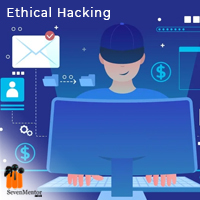Ethical Hacking
Make sure the procedure is legal before beginning to defend. The Ethical Hacking Course in Ujjain teaches a legitimate attempt to gain unauthorized access to a computer system, application, or data. It entails copying the tactics and behaviors of malicious attackers to carry out Ethical Hacking training in Ujjain. Through this method, shield flaws are set up and repaired before..
Call The Trainer
Batch Timing
- Regular: 2 Batches
- Weekends: 2 Batches
Request Call Back
Class Room & Online Training Quotation
About Ethical Hacking
Main ethical hacking ideas
Four fundamental concepts in the protocol are followed by hackers:
Limit the scope- So that the work of the ethical hacker remains ethical and within the confines of the organization's approved bounds, decide the extent of the assessment. Data monitoring is the world's best course of action.
Report weaknesses- Send an email to the organization letting them know about every vulnerability found. To address these vulnerabilities, offer repair guidance.
The sensitivity of data- Ethical Hacking classes in Ujjain candidates may need to sign a non-disclosure agreement in addition to other terms and conditions requested by the evaluated firm, depending on how sensitive the data is. To Access The Data And Guarantee Security.
Why Is Legal Hacking Ethical?
Computers are now a common instrument for committing crimes and conducting business. Cyber law is the point at which the legal system and information technology, which have hitherto had to interact separately, must now come together. The Information and Technology Act of 2000 (IT Act) has sections 43 and 66 that regulate all types of cybercrime perpetrated in the nation, including hacking. However, the term "hacker" made it acceptable in 2008. Governments and companies are starting to use an approach to deal with the problem of network security where they test their security by letting computer security experts break into their systems.
Ethical hacking's legal ramifications
Data breaches, internet fraud, and other security vulnerabilities brought on by cybercrime now pose a threat to the entire world. To safeguard the rights of netizens and their online transactions, hundreds of new laws have been passed. They must keep in mind these rules if they want to enter a system or network with good intentions. Hackers carry out a code that guards and destroys unsafe threats.
The Information Technology Act of 2000 came into effect when India approved the model law on internet commerce from the United Nations Commission on International Trade Law.
In accordance with Section 43 of the Act, anybody who alters, destroys, interferes with, downloads, copies, or extracts any data or information from a computer or computer network without the owner's or another responsible party's consent may be held liable for damages.
Since the IT Act's section 43-A states that anyone who fails to secure data is liable for compensation, an ethical hacker who works for a firm and neglects to protect the data under his control will be found guilty and subject to financial penalties.
Anyone who harms, copies, extracts, or does any other action without the owner's consent is in violation of Section 66 of the IT Act, which deals with computer-related offenses. Look for a certified skill and a formal education.
The upcoming of ethical hacking
The demand for highly competent hackers is anticipated to rise as Ethical Hacking Course in Ujjain develops. By 2025, the Bureau of Labor Statistics predicts that there will be close to 35 million unfilled positions in the information security sector. As a result, more businesses will continue to hire IT professionals to better protect their data, which will keep ethical hackers in demand.
For people who desire to become ethical hackers, there is frequently plenty of employment available due to the industry's rapid expansion. In recent years, the United States' lowest unemployment rate has been recorded in the cybersecurity sector, according to Investopedia.
By shifting the focus to continuity, one tries to stop the misconceptions.
Hacking techniques
Depending on what is being hacked, we can categorize Ethical Hacking training in Ujjain into several subcategories. These are listed below:
Hacking a network
Hacking a website
Hacking of computers
password theft
Hacking of email
Network hacking: Using tools like Telnet, NS lookup, Ping, Tracert, etc., network hackers acquire information about a network with the intention of damaging the network system and impairing its functionality. Better is a technique that can withstand the threat environment in the systems.
Hacking a website entails gaining illegal access to a web server or database and changing the information within.
Hacking a computer: Ethical Hacking classes in Ujjain taught hacking in a computer refers to gaining access to it without authorization and stealing data from it, such as the user name and password for the computer.
Hacking of passwords: Hacking of passwords is the method of obtaining secret passwords from information that has already been stored in the computer system.
Email hacking: Email hacking refers to gaining unauthorized access to and use of an email account without the owner's consent.
Advantages of Ethical Hacking
Hacking has a number of benefits:
It is used to retrieve deleted data, particularly when a password has been forgotten.
It is used to carry out penetration testing to boost the network and computer's security.
It is used to evaluate your network's security.
An approach that safeguards.
Is ethical hacking a viable profession?
For all of the IT experts and aspirants out there, CEH Course in Ujjain is a very profitable career option based on the pay scale and the chances in the sector. But one must also take into account the amount of preparation and labor required to succeed in the area. The field is waiting for you with open arms if you are driven enough and prepared to put up the work to become a certified ethical hacker. Additionally, you would need a tonne of expertise and knowledge to stand out from the crowd in order to pass the CEH certification exam, which confers a professional tag. However, if you have passed all of the examinations and obtained all of the certifications, your originality and enthusiasm for cybersecurity alone may be enough to propel you to the pinnacle of your profession and earn you extremely substantial pay-outs and prizes. According to the current requirement rate and the CEH compensation that firms are offering, now is the ideal time to enter this sector and earn the most money.
Norms for becoming a Paid Ethical Hacker
Network security has been a problem for as long as there has been an internet. The interest in ethical hacking has skyrocketed over the previous couple decades. Ethical hackers operate on behalf of the "good guys" to defend computer systems from harmful attacks, in contrast to typical hackers who exploit networks for malevolent purposes. Ethical hacking, in its simplest form, is the process of breaking into a computer system to assess its security. Companies typically employ ethical hackers to carry out penetration testing. Due to their crucial role in protecting the security of an organization's IT systems, these hackers are experts in computer security.
To determine whether a company's IT system may be breached using various techniques, ethical hackers must investigate various hacking techniques. In order to stop illegal hacking, their main responsibility is to act like hackers and explore every hacking opportunity. Due of the high wages paid to hackers, a career in ethical hacking may be both immensely fulfilling and lucrative. But before you can become an ethical hacker, you need to acquire the relevant expertise in networking and programming. In order to correctly anticipate various hacking techniques, you must also have a solid understanding of all currently available operating systems. You must understand the various hacker subtypes before deciding to become an ethical hacker.
Hacker types that are ethical
Cyberterrorists
Hacktivism is the act of illegally accessing a computer system for political or social purposes. The hackers may even disrupt visitors to the website by posting a lengthy message on its home page. Some individuals utilize this as a means of protest.
Cyberwarrior
Another ambiguous ethical hacking topic is this one. Cyber Warriors are those who engage in cyber conflict and are skilled computer hackers. In essence, these are activities carried out by a state or nation to disrupt the networks or systems of another state. It depends on who you ask whether or not this kind of hacking qualifies as ethical.
Online Classes
Today, there is a significant demand for and acceptance of online Ethical Hacking course in Ujjain. We offer training in a variety of tech fields at our SevenMentor & Training Institute. Students value high-quality online courses. Students' abilities can be improved, and SevenMentor & Training Institute's courses can assist them develop their careers. Based on their skills in a variety of technological fields, our placement cell helps students choose the optimal course of action and career for them. We provide instruction in popular and career-focused subjects like networking, software, big data, hadoop, and other specialized technical fields.
Course Eligibility
Everyone has the right to their privacy. For Ethical Hacking Training there are no such necessary requirements, anyone who is curious about the hacking world can go for this course with basic knowledge of computer systems. Bellow are the some professions who generally opt for this course:
- Freshers
- BE/ Bsc Candidate
- Any Engineers
- Any Graduate
- Any Post-Graduate
- Working Professionals
- Network Administrator
- Network Security Engineers
- Information Security Professionals
- Technical Support Engineers
- System Administrators
Syllabus of Ethical Hacking
CEH Syllabus
Module 01 - Introduction to Ethical Hacking
01 - Information Security Overview
02 - Information Security Threats and Attack Vectors
06 - Penetration Testing Concepts
03 - Hacking Concepts
04 - Ethical Hacking Concepts
05 - Information Security Controls
07 - Information Security Laws and Standards
Module 02 - Footprinting and Reconnaissance
01 - Footprinting Concepts
02 - Footprinting through Search Engines
03 - Footprinting through Web Services
04 - Footprinting through Social Networking Sites
05 - Website Footprinting
06 - Email Footprinting
07 - Competitive Intelligence
08 - Whois Footprinting
09 - DNS Footprinting
10- Network Footprinting
11- Footprinting through Social Engineering
12 - Footprinting Tools
13 - Countermeasures
14 - Footprinting Pen Testing
Module 03 - Scanning Networks
01 - Network Scanning Concepts
02 - Scanning Tools
03 - Scanning Techniques
04 - Scanning Beyond IDS and Firewall
05 - Banner Grabbing
06 - Draw Network Diagrams
07 - Scanning Pen Testing
Module 04 - Enumeration
01 - Enumeration Concepts
02 - NetBIOS Enumeration
03 - SNMP Enumeration
04 - LDAP Enumeration
05 - NTP Enumeration
06 - SMTP Enumeration and DNS Enumeration
07 - Enumeration Countermeasures
08 - Other Enumeration Techniques
09 - Enumeration Pen Testing
Module 05 - Vulnerability Analysis
01 - Vulnerability Assessment Concepts
02 - Vulnerability Assessment Solutions
03 - Vulnerability Scoring Systems
04 - Vulnerability Assessment Tools
05 - Vulnerability Assessment Reports
Module 06 - System Hacking
01 - System Hacking Concepts
02 - Cracking Passwords
03 - Escalating Privileges
04 - Executing Applications
05 - Hiding Files
06 - Covering Tracks
07 - Penetration Testing
Module 07 - Malware Threats
01 - Malware Concepts
02 - Trojan Concepts
03 - Virus and Worm Concepts
04 - Malware Analysis
05- Countermeasures
06- Anti-Malware Software
07- Malware Penetration Testing
Module 08 - Sniffing
01- Sniffing Concepts
02- Sniffing Technique: MAC Attacks
03- Sniffing Technique: DHCP Attacks
04- Sniffing Technique: ARP Poisoning
05- Sniffing Technique: Spoofing Attacks
06- Sniffing Technique: DNS Poisoning
07- Sniffing Tools
08- Countermeasures
09- Sniffing Detection Techniques
10- Sniffing Pen Testing
Module 09- Social Engineering
01 - Social Engineering Concepts
02 - Social Engineering Techniques
03- Insider Threats
04 - Impersonation on Social Networking Sites
05 - Identity Theft
06 - Countermeasures
07 - Social Engineering Penetration Testing
Module 10- Denial-of-Service
01 - DoS/DDoS Concepts
02 - DoS/DDoS Attack Techniques
03 - Botnets
04 - DDoS Case Study
05 - DoS/DDoS Attack Tools
06 - Countermeasures
07 - DoS/DDoS Protection Tools
08 - DoS/DDoS Attack Penetration Testing
Module 11- Session Hijacking
01- Session Hijacking Concepts
02- Application Level Session Hijacking
03- Network Level Session Hijacking
04- Session Hijacking Tools
05- Countermeasures
06- Penetration Testing
Module 12 - Evading IDS, Firewalls, and Honeypots
01- IDS, Firewall, and Honeypot Concepts
02- IDS, Firewall, and Honeypot Solutions
03- Evading IDS
04- Evading Firewalls
05- IDS/Firewall Evading Tools
06- Detecting Honeypots
07- IDS/Firewall Evasion Countermeasures
08- Penetration Testing
Module 13- Hacking Web Servers
01- Web Server Concepts
02- Web Server Attacks
03- Web Server Attack Methodology
04- Web Server Attack Tools
05- Countermeasures
06- Patch Management
07- Web Server Security Tools
08- Web Server Pen Testing
Module 14- Hacking Web Applications
01 - Web App Concepts
02 - Web App Threats
03 - Hacking Methodology
04 - Web Application Hacking Tools
05 - Countermeasures
06 - Web App Security Testing Tools
07 - Web App Pen Testing
Module 15- SQL Injection
01 - SQL Injection Concepts
02 - Types of SQL Injection
03 - SQL Injection Methodology
04 - SQL Injection Tools
05 - Evasion Techniques
06 - Countermeasures
Module 16- Hacking Wireless Networks
01 - Wireless Concepts
02 - Wireless Encryption
03 - Wireless Threats
04 - Wireless Hacking Methodology
05 - Wireless Hacking Tools
06 - Bluetooth Hacking
07 - Countermeasures
08 - Wireless Security Tools
09 - Wi-Fi Pen Testing
Module 17- Hacking Mobile Platforms
01- Mobile Platform Attack Vectors
02- Hacking Android OS
03- Hacking iOS
04- Mobile Spyware
05- Mobile Device Management
06- Mobile Security Guidelines and Tools
07- Mobile Pen Testing
Module 18- IoT Hacking
01- IoT Concepts
02- IoT Attacks
03- IoT Hacking Methodology
04- IoT Hacking Tools
05- Countermeasures
06- IoT Pen Testing
Module 19- Cloud Computing
01 - Cloud Computing Concepts
02 - Cloud Computing Threats
03 - Cloud Computing Attacks
04 - Cloud Security
05 - Cloud Security Tools
06 - Cloud Penetration Testing
Module 20- Cryptography
01- Cryptography Concepts
02- Encryption Algorithms
03- Cryptography Tools
04- Public Key Infrastructure (PKI)
05- Email Encryption
06- Disk Encryption
07- Cryptanalysis
08- Countermeasures
Trainer Profile of Ethical Hacking
Our Trainers explains concepts in very basic and easy to understand language, so the students can learn in a very effective way. We provide students, complete freedom to explore the subject. We teach you concepts based on real-time examples. Our trainers help the candidates in completing their projects and even prepare them for interview questions and answers. Candidates can learn in our one to one coaching sessions and are free to ask any questions at any time.
- Certified Professionals with more than 8+ Years of Experience
- Trained more than 2000+ students in a year
- Strong Theoretical & Practical Knowledge in their domains
- Expert level Subject Knowledge and fully up-to-date on real-world industry applications
Ethical Hacking Exams & Certification
SevenMentor Certification is Accredited by all major Global Companies around the world. We provide after completion of the theoretical and practical sessions to fresher’s as well as corporate trainees.
Our certification at SevenMentor is accredited worldwide. It increases the value of your resume and you can attain leading job posts with the help of this certification in leading MNC’s of the world. The certification is only provided after successful completion of our training and practical based projects.
Proficiency After Training
- Daily Malware Analysis, Protocol analysis.
- Can do reverse Engineering to secure the network
- Perform Debugging in Case find any issue related with Security
- Test the application security
- Harden Computer Security and remove vulnerabilities by penetrating networks or computer systems.
Key Features
Skill level
From Beginner to Expert
We are providing Training to the needs from Beginners level to Experts level.
Course Duration
12 weeks
Course will be 90 hrs to 110 hrs duration with real-time projects and covers both teaching and practical sessions.
Total Learners
2000+ Learners
We have already finished 100+ Batches with 100% course completion record.
Frequently Asked Questions
Batch Schedule
| DATE | COURSE | TRAINING TYPE | BATCH | CITY | REGISTER |
|---|---|---|---|---|---|
| 17/03/2025 |
Ethical Hacking |
Online | Regular Batch (Mon-Sat) | Ujjain | Book Now |
| 18/03/2025 |
Ethical Hacking |
Online | Regular Batch (Mon-Sat) | Ujjain | Book Now |
| 15/03/2025 |
Ethical Hacking |
Online | Weekend Batch (Sat-Sun) | Ujjain | Book Now |
| 15/03/2025 |
Ethical Hacking |
Online | Weekend Batch (Sat-Sun) | Ujjain | Book Now |
Students Reviews
Classes at sevenMentor could make me fully learn the aspects because they were well-organized. Given the success of their classes, the trainers here are well-known. Good conduct of tests.
- Ranjeet Pandey
Excellent learning environment. The speed of learning increases, as do all the study resources. It is helpful to practice by taking tests.
- Vikas Shende
These courses are numerous. What I learned here was the best technical aspect. Practically understanding the features was made a lot easier by the beneficial classes.
- Pranjali Shelke
Course video & Images



Corporate Training
Employees who take a range of courses can advance their careers and increase their expertise. By improving candidates' skills, the Corporate Ethical Hacking classes in Ujjain enables them to pursue a wider professional route. Trainers at SevenMentor & Training Institute get candidates ready for employment. The opportunity to learn and expand one's skill set is excellent for both employees and students. A skilled workforce can increase a company's productivity. Professionals in a variety of fields make up our professors. Employee development and training may benefit from this.
Our Placement Process

Eligibility Criteria

Placements Training

Interview Q & A

Resume Preparation

Aptitude Test

Mock Interviews

Scheduling Interviews

Job Placement

Related Courses
Have a look at all our related courses to learn from any location
You forgot Pattern, Pin, Password lock on android phones? want to Spy on a friend’s device? Learn with Mobile Hacking Training in Pune.
The SevenMentor Pvt Ltd has launched a new Certification in Cyber Security in Pune, saying it will help address the shortage of Cyber Security professionals.
In today’s Cybersecurity world, the power to conduct a correct forensic investigation at the scene of against the law is of utmost importance.
Request For Call Back
Class Room & Online Training Quotation

